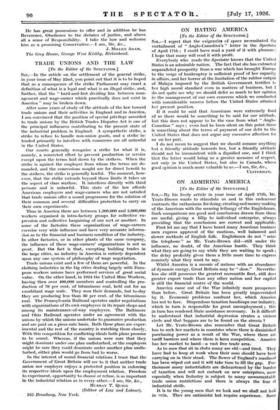TRADE UNIONS AND THE LAW
[To the Editor of the SPECTATOR.]
Sin,—In the article on the settlement of the general strike, in your issue of May 22nd, you point out that it is to be hoped that as a consequence of the strike Parliament may enact a definition of what is a legal and what is an illegal strike, and, further, that the " hard-and-fast dividing line between man- agement and wage-earner which practically does not exist in America," may be broken down.
After some years of study of the attitude of the law toward trade unions and their activities in England and in America, I am convinced that the position of special privilege accorded to trade unions by the British Trades Disputes Act is one of the principal influences contributing to the present state of the industrial problem in England. A sympathetic strike, a strike to refuse to handle non-union goods, and a strike in- tended primarily to interfere with commerce are all unlawful in the United States.
Our courts generally recognize a strike for what it is, namely, a concerted effort to prevent production or service except upon the terms laid down by the strikers. When the strike is against the employer from whom the terms are de- manded, and the concessions sought are for direct benefit to the strikers, the strike is generally lawful. The moment, how- ever, that the strike extends beyond those limits it takes on the aspect of class warfare. It interferes directly with third persons and is unlawful. This state of the law affords American employers and wage-earners who are not satisfied that trade unions offer a sound programme for the solution of their common and several difficulties protection to carry on their own experiments.
Thus in America there are between 1,500,000 and 2,000,000 workers organized in intra-factory groups for collective ex- pression and collective bargaining of one sort or another. In some of the factories these organizations of wage-earners exercise very wide influence and have very accurate informa- tion as to the financial and business condition of the industry. In other factories, or in other plants of the same company, the influence of these wage-earners' organizations is not so great. But the fact is that, excepting building trades in the large cities, no industry in America is entirely dependent upon any one system of philosophy of wage negotiation.
Trade unions exist and a few of them are powerful. In the clothing industries in the big cities dealing largely with Euro- pean workers unions have performed services of great social value. On the other hand, in 1924 the United Mine Workers, having then over 400,000 members and controlling the pro- duction of 70 per cent. 'of bituminous coal, held out for an exorbitant wage scale. They won their demands, but to-day they are producing less than 80 per cent. of the bituminous coal. The Pennsylvania Railroad operates under negotiations with organiiations of its own employees in its repair shops and among its maintenance-of-way employees. The Baltimore and Ohio Railroad_ operates under an agreement with the unions by which the, unions undertake to guarantee production and are paid on a piece-rate basis. Both these plans are exper- imental and the rest of the country is watching them closely, With this competition for conflicting ideals both plans promise to be sound. Whereas, if the unions were sure that they might dominate under one plan undisturbed, or the employers might be sure they could dominate under another plan undis- turbed, either plan would go from bad to worse.
In the interest of sound financial relations I trust that the Government of Great Britain will see to it that neither trade union nor employer enjoys a protected position in enforcing its respective ideals upon the employment relation. Freedom to experiment, opportunity-to choose or refuse, is as important in the industrial relation as in every other.—I am, Sir, &c.,
MURRAY T. QUIGO










































 Previous page
Previous page